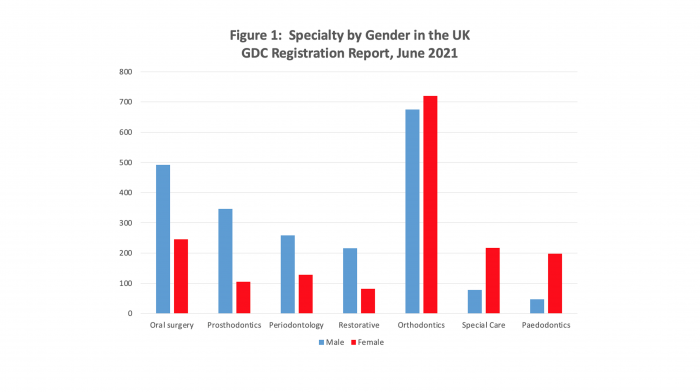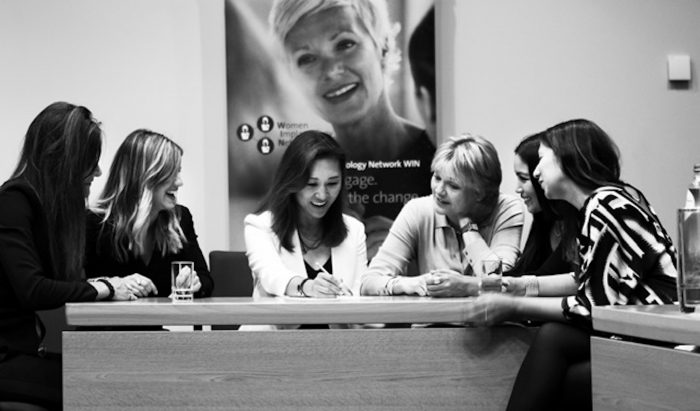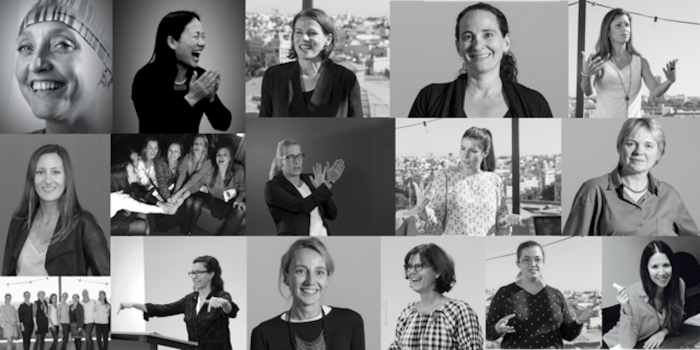Looking to WIN
In the UK there are almost equal numbers of men and women registered as dentists with the GDC: 48.7 per cent males and 51.3 per cent females as of June 2021. Alongside these figures, in the past 10 years we have seen a consistent dominance of female new registrations: 63 per cent (female) versus 37 per cent (male) in the year 20191.
It is clear that young women are choosing to become dentists and are not put off by the high entry requirements or the five-year undergraduate degree. You might therefore expect a gradual shift towards a female biased profession with a proportional increase in female involvement across all fields of dentistry, including implant dentistry.
However, this is not what we see. In the UK, there is not a specific specialist list for implant dentistry and all dentists can be involved in implant dentistry without being a registered specialist in a related field, it is therefore not easy to have an accurate measure of the number of women involved in this discipline. However, the low involvement of women in this field is visible in other ways.
I have been attending UK implant related conferences for the past 20 years and low female participation is very evident. In this setting there is very low female representation both as conference participants and speakers. A survey of female speaker representation at six recent UK implant related conferences revealed an average of 20 per cent, with a range from as low as 7 per cent. Clearly far short of the 50 per cent of females registered with the GDC.
If we take a close look at the male/female split on the UK specialist lists (Fig 1), we see that women are taking on the challenges of post-graduate training in some fields- such as Orthodontics, Paedodontics and Special Care Dentistry, but seem to be actively avoiding other specialities. It is clear that there is low female representation in the surgical and restorative based specialities, all of which are likely to include implant dentistry skills.

Does it matter?
Well, yes, we believe it does – on a personal level, a patient level, a professional level, and a societal level.
On a personal level we want to ensure that the bright young women that are clearly capable of the academic and clinical challenge of undergraduate dental training, are then supported to fulfil their full professional potential within their working career.
On a professional level, we want to see a true cross section of speakers, leaders, and role models to encourage and inspire the next generation, and we want the profession to benefit from full involvement of this talent.
On a patient level, we need to ensure that all dentists have an adequate knowledge of implant dentistry so that they feel confident to refer their patients for implant treatment and then have the skills to maintain them in the longer term, and to allow progression to further training to be able to offer implant restorative or surgical treatment themselves, if they wish to do so.
Furthermore, within society and within our wider profession, there is an increasing awareness of equality and diversity, and the importance of inclusivity. In May of this year the Diversity in Dentistry Action Group (DDAG) published a document titled: ‘Equality diversity and inclusion within dentistry’2. DDAG is strongly supported by many of our key national dental organisations, including the BDA and the GDC and this document is a landmark step towards improving overall diversity. DDAG’s mission statement is ‘to promote a collaborative approach to shape a dental profession which respects, values and lives by the principles of equality, diversity and inclusion.’ Women are part of the equality and diversity.
So, WIN ITI UK and Ireland is working to make a difference…
Who are we?
We are a committee of three women, each involved in implant dentistry from a different speciality perspective. Our Chair is Nicola Cross, Specialist in Oral Surgery, and is supported by Narinder Dhadwal, Specialist in Periodontology and myself, Adela Laverick, a Specialist Prosthodontist working in practice in Perthshire. As a committee we work in conjunction with both the Women’s Implantology Network (WIN) and the International Team for Implantology (ITI) to engage, inspire and support female dental professionals within implant dentistry. As such, we are working to raise awareness of both organisations.

The Women’s Implantology Network (WIN)
WIN was first established in 2016 and is led by a global core team of female dental professionals, all of whom are accomplished implant clinicians in their own countries. Together, with support of an administration team in Basel, Switzerland, WIN global is working to increase the engagement of women in implant dentistry at all levels: from being confident to talking to patients about implant treatment, to taking on further training themselves. WIN also aims to raise the profiles of women working within this field and to empower them to follow their ambitions and advance into leadership roles, so to make them more visible.

WIN now has over 4,000 members from 136 different countries. Within the member countries we see a recurring pattern: despite high numbers of women qualifying as dentists, relatively few are taking on the challenges of a career in implant dentistry.
Membership of WIN is entirely free and gives you immediate access to this ever-growing global supportive network. Members receive a bi-monthly digital newsletter packed with interesting relevant news items and education content. A key benefit is that WIN members get access to the ‘WIN Classroom’ within the ITI.net. The classroom provides easily accessible links to topic-based learning material selected from the wider ITI Academy. For non-ITI members the WIN classroom provides an insight into what a comprehensive and extensive educational resource the ITI Academy is.
The International Team for Implantology (ITI)
The ITI, established in 1980, is the largest international academic organisation in implant dentistry. It aims to promote and disseminate knowledge of implant dentistry and related fields via both on-line and in-person educational activities. A key benefit of ITI membership is the local study club structure which brings together like-minded clinicians for networking and learning opportunities in their local area. This strong and supportive local network benefits all members but will be especially nurturing for dentists that are new to the discipline, as it offers possibilities to talk through cases or problems with more experienced clinicians.
What are the barriers?
As a group we have carried out our own research including looking at relevant studies, carrying out personal interviews and a closed face-book page. It is clear that this is a complex, multi-factorial problem and it will inevitably take time to begin to make a difference.
It is a generalisation, but one that is commonly accepted that women are more risk averse. Implant dentistry is considered to be relatively high-risk treatment and therefore women are less likely to take on the challenge. However, we can turn this into a strength and redefine it as being ‘risk-aware’, rather than ‘risk averse’. A risk aware dentist will take care to plan and execute treatments to minimise the risks to the patient and maximise the benefits. A clear advantage when providing potentially complex treatments.
Another common theme is the work-life balance. Inevitably many women will be the main care providers for their families and often these demands will require flexibility in their work. As a profession dentistry is an incredibly flexible career that does allow women to work part-time at a high level. In my experience, providing implant treatment in a specialist setting has allowed me to work part-time at a high level of interest, engagement, and financial reward. It is true that the training was at times more demanding of my time and energy, but the rewards are worth the earlier investment of that time and energy.
Another potential difficulty for all dentists is the lack of a set training pathway. The discipline of implant dentistry is a relatively young one when compared with more traditional specialities such as Orthodontics and Prosthodontics, and it is not a GDC recognised speciality subject. This makes it more difficult for our young graduates to plan their training because there is not a well-defined path. Being a member of a national organisation such as the ITI can provide invaluable support, advice, and reputable training courses to set an interested dentist on the right path.
The challenge of being inclusive
WIN and the ITI embrace mutual collaboration across specialities, age, gender, and culture. As such, we encourage male colleagues to also join WIN to help and support us make a change. It is very important that we work with, and alongside our male colleagues to support and empower the female talent to become more visible.
Personally, I also hope, that by raising the profile of implant dentistry itself as an interesting and rewarding career option, and by providing a welcoming and supportive network for interested clinicians, that as a group we might help to contribute to overall diversity and equality within our profession.

Future events
To help our group become more visible we have planned a great program of four on-line webinar events. It’s a progressive program taking participants from the planning stage of implant treatment through to the execution, and then maintenance stages. For each of these events we have collaborated with the WIN global core team to showcase a talented female speaker; this also helps to raise the profile of female speakers.
Our next event is on September 16th, 7-9pm, and will focus on restorative aspects of implant treatment: ‘Implant prosthodontics: critical factors for success with WIN global leader Anja Zembic from Switzerland.
The final event in this year’s series is on November 25th, 7-9pm ‘A focus on establishing and maintaining peri-implant health’, featuring WIN global leader France Lambert, and UK specialist in periodontics, Ana Gamboa.
Registration for these events is via ITI.net and is free for WIN and ITI members. Non-ITI members are welcome to attend up to two ITI events as a complimentary introduction to the ITI.
In addition we are very excited to be hosting a breakfast WIN ITI networking event at the forthcoming ITI UK and Ireland Congress, planned for 1 and 2 October, in-person, in Edinburgh. Please do join us for breakfast at 7.45am on Friday 1 October, an opportunity for a social start to the congress, to network and meet with like-minded colleagues and learn more about WIN ITI UK and Ireland. And, we will be joined by guest speaker Nadine Montgomery, who will share the personal story behind the change in dental and medical consent. Registration details will follow via ITI.org and social media posts.
Step by step, we hope to become more visible and to gradually strengthen the network.
How can you become engaged?
WIN welcomes new members – whatever your current level of engagement in implant dentistry. Please consider joining – it’s free and easily accessible via the QR code.

Please do join us for our webinar events in September and November, and if you are coming to the Edinburgh ITI congress in October, then please register for the networking breakfast event.
We would welcome contact from all interested parties: whether you are starting out or more experienced and feel you might be able to support our initiative.
Together, we are stronger!
Inspire. Engage. Be part of the change – WIN ITI UK and Ireland Section.

Dr Adela Laverick is a Perthshire-based Specialist Prosthodontist (contact Adela at info@blackhillsclinic.com)
References
1GDC Registration Statistical Report 2019
2Equality Diversity and Inclusion within Dentistry. A profession wide commitment. May 2021.


You must be logged in to post a comment.